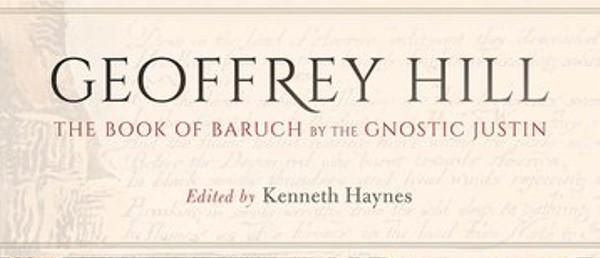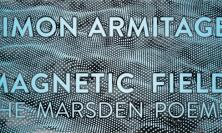The poet Geoffrey Hill (1932 – 2016) was a considerable figure. As well as poetry he produced literary criticism, and taught at the Universities of Leeds, Cambridge and Boston. From 2010 to 2015 he was Professor of Poetry at Oxford. As Hill’s longstanding and careful editor Kenneth Haynes puts it, the present volume was planned, ‘as a posthumous work, to consist of as many poems as he would live to complete.’ In the end we’re given 271 poems, each one untitled but duly numbered. And number 186 describes the collection as becoming ‘more a daybook than ever’.
The title is carefully and teasingly obscure. The ‘Gnostic’ Justin is an elusive though somewhat heretical figure, unlike the quite different Justin ‘Martyr’ who was both a good philosopher and theologian. Nevertheless, Justin Martyr is referenced: ‘the Word of God became a babe that cried’ (156). The Book of Baruch is an apocryphal or, depending on your canon of scripture, a deuterocanonical Old Testament work. Hill’s Justin and Baruch seem to present a detached ambiguity and engagement pleasing to Hill. The title, although final, is not a conclusion: ‘Not precisely Baruch by the book…’ (33)
The poems are a combination of views, perceptions and memories – childhood and the Second World War, bombed churches, literary figures read and approved of (or otherwise), saints, artists (Brueghel is a frequent choice). There are many remarks throughout on poetry and indeed on poets. Poems are ‘gathered samphire’ and the ‘prime enforcer of the realm’ (128, 129). Hopkins is naturally included and in surprisingly deft and accurate phrases: ‘that admirably level-headed and objective poet’ (49) who is ‘tough and nesh’ (210), although in Dublin, ‘finally even he / began to complain’ (214). Less expectedly another Jesuit poet, Robert Southwell, is also included: ‘… Father Southwell, that saint of courteous but steely dissent, / whose soul was ever at the knife’s point of self-attaint, though in truth / he had no cause to fear God’s Wrath.’ (125) For Hill, the Jesuit ‘… mission to England fell into misprision / and ended badly, except for the curious precision of their style both / prose and verse.’ (169)
Brexit does appear, though Hill wrote before the current impasse, political fragmentation and institutional cul-de-sac. However, he is clear enough about his intentions for the EU Referendum: ‘I shall vote to remain’ (240). Jeremy Corbyn makes several appearances: ‘Corbyn must win. Though he is a flawed man it is not my belief that Hogarth / would set him down as a tout or a thief.’ (186) Indeed, there are political themes, though – oddly perhaps – no narrow politics. How poetry and politics might relate is wonderfully uncertain[i] and Hill has relevant aperçus. There is ‘Poem as wrong key to the right kingdom’ (198), or ‘Poem as the need to conform to some imagined power that could redeem a / near fatal solecism’ (200). Maybe poetry gives perceptions which are political (including ecclesiastical politics). Hence: ‘The middle echelon of a sacred institution, much like the constitution of a / secular state, confounds hierarchy with hegemony. Always has done.’ (201) It is a point reinforced by repetition: ‘To suppose hegemony hierarchy: is not that the root of all our woes?’ (268) Indeed it may help not to mistake the one for the other, about which Hill has a good sharp phrase: ‘the untenable sanctity of abiding things’ (47). He is also well aware that the origin of poetry can be visceral and its emergence a struggle. So: ‘The poem begins as a small tight maelstrom somewhat at knee height, not / quite touching your shins’ (105). But to recognise, shape and pursue – or be given – the import of the maelstrom requires language: ‘O language, my allergy, my bloody colleague!’ (190) Real poetry is not the easiest of things to write or read.
If you know and like Hill, this volume is clearly a must. But it may well not be a good introduction. A lot, following Justin and Baruch, is gnomic; and the structure of the poems can seem episodic, epigrammatic. Poetry commonly gets somewhere, but does not arrive at a conclusion as much as a holding together. That’s what the poem as a whole does. And it may well hold ambiguities together. In this collection, however, the ‘holding together’ is for my taste somewhat fraught. Hill’s earlier work would most likely make a far better introduction, although it’s not a case of the earlier the better. I liked the 1978 collection Tenebrae, notably ‘Lachrimae’ (which has a superscript from Robert Southwell) and ‘The Pentecost Castle’. The opening lines of the latter’s fourth section:
At dawn the Massburgeons from stone a Jesse treeof resurrectionare precisely evocative. The poem ends with ‘forlorn altars’; clearly there is an ongoing engagement or pilgrimage which matters.
The last line of the last poem in the present collection is appropriately a series of dots …. which follow the preceding two lines of words: ‘Even so, the power of stout roses has risen watt by watt against the afterglow of / each brief thunder-shower.’ These are good words in the last year of life. Pilgrimages surely need ‘stout roses’.
[i] Arguably propaganda ‘poetry’ isn’t quite poetry. Nevertheless, ‘poetry is often roused into being by the ways in which power throttles life and spirit’ – see Ben Okri’s introduction to his anthology, Rise Like Lions: Poetry for the Many (Hodder & Stoughton, 2018).






